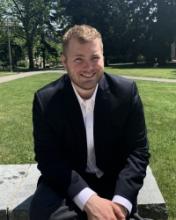It was a warm September day in 2016 when I was walking with a group of international students along cobblestoned streets discussing the trials and tribulations of finding the best coffee place in town when we turned a corner and came upon a sizeable group of people gathered around an (in my mind) absurdly long table. Before I was able to inquire as to the nature of the gathering, a remarkable sound grew steadily in volume and intensity, drawing the eyes of all observers to a balcony set into the face of a magnificent eighteenth-century urban residence, the Erbdrostenhof, where a renown opera singer exemplified her craft to the benefit and pleasure of her audience. As to the thoughts of my companions, I can only speculate. My own, however, converged upon a singular act of recognition.
I wasn’t in Kansas anymore.
I had arrived in Münster, Germany, a city of modest size yet exceptional beauty. Located northeast of the larger metropolitan areas belonging to the cities Dortmund, Düsseldorf, and Köln, an hour’s drive west of Bielefeld and two hours east of the border with the Netherlands, Münster houses many cultural amenities, perhaps most prominently the Westfälische Wilhelms-Universität Münster, with whose Germanistik program our own shares strong ties going back decades. It is on account of the special relationship that I was there at all, taking advantage of the opportunity to participate in a graduate student exchange where I would have the opportunity to teach my own English-language courses at the Sprachenzentrum (language center), audit lectures produced by the Germanistik program’s lauded faculty, and, thanks to the generosity of Pr. Martina Wagner-Egelhaaf, who presided over the exchange program at the time, I was also able to participate in several research colloquiums. Indeed, my time in Münster (1. September 2016 – 31. July 2017) is one I remember fondly.
And now I get to do it again.
For the academic year 2022-23, I will return to Münster, taking advantage of its resources and atmosphere to complete my dissertation. It will be a year of highly focused research balanced by long walks (I will likely still refuse to get a bike in spite of the fact that the city if frequently cited as the bike capital of Germany) and brief trips to other areas of Germany. I look forward to a year of engaging scholarship and hope to make the whole experience as memorable as the last.
Society of Scholars Summer Dissertation Fellowship
Thanks to generous funding from the Simpson Center for the Humanities, I will have the opportunity to work on my dissertation exclusively for the entirety of Summer 2022. As one of six recipients of the Society of Scholars Summer Dissertation Fellowship, I will take advantage of the extra time to delve more deeply into my research and accelerate the development of my dissertation ahead of academic year 2022-23. Beginning June 30th, recipients of the award will meet weekly, where one person will present their research and seek feedback from other participants. The aim of these meeting is to make use of a collaborative and interdisciplinary environment to boost the quality and accessibility of our research. I look forward to working alongside Gust Burns (English), Brendan McElmeel (History), Diana Molkova (Classics), Maxine Savage (Scandinavian Studies), and Jingsi Shen (Cinema and Media Studies).
Article Publication
Childs, Matthew. “Kleist, Rousseau, and Das Erdbeben in Chili: Catastrophe as the Road to Reconciliation.” Lessing Yearbook, edited by Carl Niekerk and Gabriela Stoicea, vol. 48, 2021, 151–166.
From the text:
“Heinrich von Kleist’s Das Erdbeben in Chili (1807) is a novella that interrogates the very nature of the social order, using a catastrophic event to unearth the invisible structures that organize the everyday life of the modern subject. By means of various narrative strategies, intertextual references, and allusions to historical phenomena, Erdbeben generates a representation of a particular social model, that of the philosopher Jean-Jacques Rousseau (1712-1778), before subjecting it to a stress test, assessing its limits in order to expose its flaws […].
This paper examines Kleist’s Erdbeben in order to delineate his reception of the theories of social evolution and the social contract in the work of Jean-Jacques Rousseau and how he used them as a means to grapple with the troubling times in which he lived. In addition to establishing a connection between Das Erdbeben in Chili and the aforementioned social theories, as well as tracing the narrative’s earthquake to the historical Lisbon Earthquake of 1755, I will demonstrate how Kleist’s Erdbeben works to reconcile the shortcomings of Rousseau’s philosophy – identifiable in the aftermath of the French Revolution – with the needs of his own time, mirroring Rousseau’s argumentation concerning the events of the Lisbon Earthquake in his letter to Voltaire following the publication of his Poème sur le désastre de Lisbonne (1756).”
I would like to thank the editors of this edition of the Lessing Yearbook, Carl Niekerk and Gabriela Stoicea, for their guidance in my first scholarly publication. I would like to thank my friend and colleague, Jeffrey Jarzomb, too, for his assistance and our always thought-provoking conversations.
